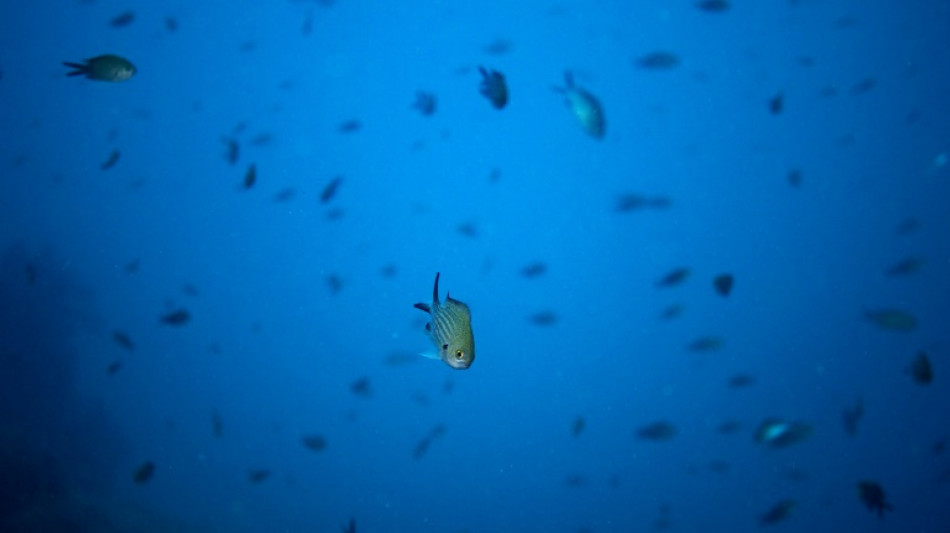
-
 UK's Starmer offers 'plan for change' in reset bid after 150 days
UK's Starmer offers 'plan for change' in reset bid after 150 days
-
South Korea president clings to power after martial law U-turn

-
 Presidential vote seen as referendum on Romania's European future
Presidential vote seen as referendum on Romania's European future
-
Hamilton bids farewell to Mercedes as Ferrari vie for title

-
 New Zealand unchanged in bid to hit back against England
New Zealand unchanged in bid to hit back against England
-
Macron seeks remedy to France's political crisis

-
 New Natalia Lafourcade album celebrates music's onstage evolutions
New Natalia Lafourcade album celebrates music's onstage evolutions
-
Taiwan's Lai kicks off visit to US territory Guam

-
 Ivory Coast staple cassava meal gains UNESCO heritage status
Ivory Coast staple cassava meal gains UNESCO heritage status
-
OpenAI to partner with military defense tech company

-
 Liverpool held but Slot salutes 'special' Salah
Liverpool held but Slot salutes 'special' Salah
-
Man City needed to break losing 'routine', says Guardiola

-
 Leipzig down Frankfurt to reach German Cup quarters, Cologne strike late
Leipzig down Frankfurt to reach German Cup quarters, Cologne strike late
-
Mbappe admits penalty miss 'big mistake' as Bilbao beat Real Madrid

-
 'Sad, disappointed' Mbappe pays penalty as Bilbao beat Real Madrid
'Sad, disappointed' Mbappe pays penalty as Bilbao beat Real Madrid
-
US stocks surge to records, shrugging off upheaval in South Korea, France

-
 Liverpool held in Newcastle thriller, Arsenal inflict Amorim's first defeat
Liverpool held in Newcastle thriller, Arsenal inflict Amorim's first defeat
-
Shiffrin confirms she'll miss Beaver Creek World Cup races

-
 Corner kings Arsenal beat Man Utd to close gap on Liverpool
Corner kings Arsenal beat Man Utd to close gap on Liverpool
-
Mbappe pays penalty as Bilbao beat Real Madrid

-
 NFL Jaguars place Lawrence on injured reserve with concussion
NFL Jaguars place Lawrence on injured reserve with concussion
-
North Korea, Russia defence treaty comes into force

-
 Openda hits brace as Leipzig beat Frankfurt in German Cup last 16
Openda hits brace as Leipzig beat Frankfurt in German Cup last 16
-
Schar punishes Kelleher blunder as Newcastle hold Liverpool in thriller

-
 De Bruyne masterclass helps Man City end seven-game winless streak
De Bruyne masterclass helps Man City end seven-game winless streak
-
Syrian rebels surround Hama 'from three sides', monitor says

-
 Lawyers seek leniency for France rape trial defendants, blaming 'wolf' husband
Lawyers seek leniency for France rape trial defendants, blaming 'wolf' husband
-
OpenAI chief 'believes' Musk will not abuse government power

-
 Thousands rally in Georgia after police raid opposition offices
Thousands rally in Georgia after police raid opposition offices
-
S. Korea opposition push to impeach president

-
 Powell 'not concerned' US Fed would lose independence under Trump
Powell 'not concerned' US Fed would lose independence under Trump
-
French government falls in historic no-confidence vote

-
 Syrian White Helmets chief 'dreams' of never pulling a body out of rubble again
Syrian White Helmets chief 'dreams' of never pulling a body out of rubble again
-
NBA Suns lose Durant for at least a week with ankle injury

-
 Warhammer maker Games Workshop enters London's top stocks index
Warhammer maker Games Workshop enters London's top stocks index
-
Iran Nobel winner released for three weeks, 'unconditional' freedom urged

-
 Red Cross marks record numbers of humanitarians killed in 2024
Red Cross marks record numbers of humanitarians killed in 2024
-
Johnson's Grand Slam 'no threat', says World Athletics boss Coe

-
 Qatar's emir and UK's Starmer talk trade as state visit ends
Qatar's emir and UK's Starmer talk trade as state visit ends
-
Cuba suffers third nationwide blackout in two months

-
 Russia, Ukraine to send top diplomats to OSCE summit in Malta
Russia, Ukraine to send top diplomats to OSCE summit in Malta
-
Spanish royals to attend memorial service for flood victims

-
 LPGA, USGA new policy requires female at birth or pre-puberty change
LPGA, USGA new policy requires female at birth or pre-puberty change
-
Stick to current climate change laws, US tells top UN court

-
 British Museum chief says Marbles deal with Greece 'some distance' away
British Museum chief says Marbles deal with Greece 'some distance' away
-
Pope Francis receives electric popemobile from Mercedes

-
 Gaza civil defence: thousands flee Israeli strikes, evacuation calls
Gaza civil defence: thousands flee Israeli strikes, evacuation calls
-
Trump names billionaire private astronaut as next NASA chief

-
 Pidcock to leave INEOS Grenadiers at end of season
Pidcock to leave INEOS Grenadiers at end of season
-
Seoul stocks weaken, Paris advances despite political turmoil


Mysteries and music: listening in to underwater life
When marine researchers started recording sounds in the seagrass meadows of the Mediterranean Sea they picked up a mysterious sound, like the croak of a frog, that resounded within the dense foliage -- and nowhere else.
"We recorded over 30 seagrasses and it was always there and no-one knew the species that was producing this kwa! kwa! kwa!" said Lucia Di Iorio, a researcher in ecoacoustics at France's CEFREM.
"It took us three years to find out the species that was producing that sound."
The melodious songs of whales might be familiar music of the world's underwater habitats but few people will have heard the hoarse growl of a streaked gurnard or the rhythmical drumbeat of a red piranha.
Scientists are now calling for those sounds and many thousands more to become more widely accessible.
They say a global database of the booms, whistles and chatter of the sea will help to monitor diversity in aquatic life -- and help put a name to mystery sounds like the one Di Iorio and her colleagues investigated.
Experts from nine countries are working to create what they have dubbed the Global Library of Underwater Biological Sounds -- or "GLUBS".
This would gather together recordings held all over the world and open them up to artificial intelligence learning and mobile phone apps used by citizen scientists.
While experts have been listening to life underwater for decades, the team behind GLUBS say that audio collections tend to be narrowly focused on a specific species or geographical area.
Their initiative is part of burgeoning work on marine "soundscapes" -- collecting all the sounds in a particular area to discern information about species types, behaviour and overall biological diversity.
Scientists say these soundscapes are a non-invasive way to "spy on" life underwater.
In a paper published recently in the journal Frontiers in Ecology and Evolution, the GLUBS team said many fish and aquatic invertebrates are mainly nocturnal or hard to find, so acoustic monitoring could help conservation efforts.
"With biodiversity in decline worldwide and humans relentlessly altering underwater soundscapes, there is a need to document, quantify and understand the sources of underwater animal sounds before they potentially disappear," said lead author Miles Parsons of the Australian Institute of Marine Science.
- Sonic 'barcode' -
Scientists believe that all 126 marine mammal species emit sounds, as do at least 100 aquatic invertebrates and some 1,000 fish species.
The sounds can convey a wide range of messages -- acting as a defence mechanism, to warn others of danger, as part of mating and reproduction -- or just be the passive noise of an animal munching a meal.
Di Iorio, a co-author on the GLUBS paper, said while marine mammals, like humans, learn their language of communication, the sounds made by invertebrates and fish are "just their anatomy".
Many fish produce a distinctive drumming sound using a muscle that contracts around their swim bladder.
"This dum-dum-dum-dum-dum, the frequency, the rhythm and the number of pulses vary from one species to another. It's very specific," Di Iorio told AFP.
"It's like a barcode."
Scientists can recognise families of fish just from these sounds, so with a global library they might be able to compare, for example, the thrumming calls of different grouper fish in the Mediterranean to those off the coast of Florida.
But another key use for the library, they say, could be to help identify the many unknown sounds in the world's seas and freshwater habitats.
- Mystery music -
After many months investigating the strange seagrass croaker, Di Iorio and her colleagues were able to point the finger of suspicion at the scorpionfish.
But they struggled to explain how it was making such an unusual noise -- and it refused to perform for them.
They tried catching the fish and recording it in a carrier. They sunk sound equipment onto the seabed next to the fish. They even listened in to aquariums that contained scorpionfish.
"Nothing," she said.
Eventually colleagues from Belgium took a camera that could record at low light and staked out some seagrass in Corsica.
They were able to capture the kwa! kwa! sound as well as video of the fish making a shimmying motion.
Back in the lab, they dissected a scorpionfish and found that they have tendons strung along their bodies.
Their hypothesis is that the fish contracts these muscles to produce the sound.
"It's a guitar, an underwater guitar," said Di Iorio.
But there are many more mysteries where that came from.
Di Iorio said in the Mediterranean, up to 90 percent of noises in a given recording might be unknown.
"Every time we put a hydrophone in the water we're discovering new sounds," she added.
F.Pavlenko--BTB


